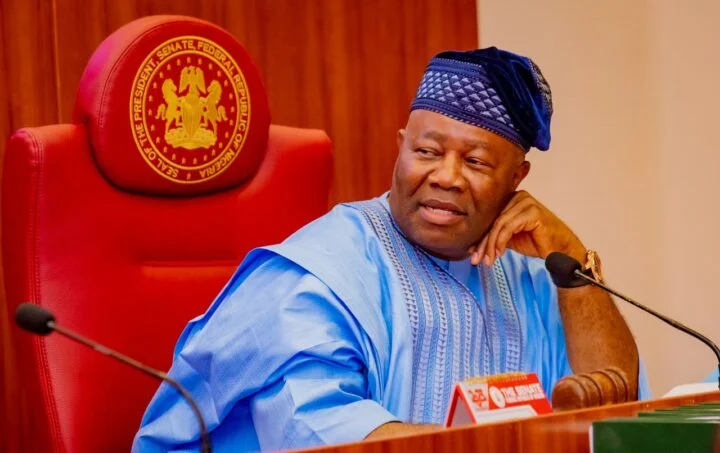In recent years, the Nigerian Senate has veered off course, becoming an institution that appears increasingly distant from its role as an independent and robust arm of government. From the tenure of Bukola Saraki to the current leadership under Godswill Akpabio, the Senate’s trajectory has raised concerns about its autonomy, effectiveness, and commitment to the Nigerian populace.
The Saraki era: A bastion of independence
Bukola Saraki’s tenure as President of the Senate from 2015 to 2019 was marked by a pronounced assertion of legislative independence. Saraki, a former governor of Kwara State and a member of the ruling All Progressives Congress (APC), often found himself at odds with President Muhammadu Buhari’s administration.
This friction stemmed from Saraki’s insistence on the Senate’s constitutional role as a check on executive power.
Under Saraki’s leadership, the Senate resisted numerous executive proposals deemed detrimental to democratic governance.
This included the rejection of budget and loan proposals that lacked transparency. Saraki’s Senate also played a critical role in investigating various corruption allegations within the executive arm, further straining relations with the presidency.
Despite being labeled a stumbling block by Buharists and APC loyalists, Saraki’s tenure underscored the importance of a Senate that could challenge and hold the executive accountable.
This period, though tumultuous, was characterized by a legislative body striving to uphold the principles of checks and balances enshrined in Nigeria’s constitution.
Lawan’s rubber stamp Senate
With the exit of Saraki and the ascension of Ahmed Lawan as Senate President in 2019, the dynamics within the Senate shifted dramatically. Lawan, a staunch ally of President Buhari, steered the Senate in a direction that many critics describe as subservient to the executive.
This shift was epitomized by the Senate’s swift approval of executive requests, often without rigorous scrutiny. Lawan’s tenure saw the Senate becoming an extension of the executive, earning the moniker “rubber stamp” from disgruntled Nigerians.
Under his leadership, the Senate approved multiple loan requests from the executive, significantly increasing Nigeria’s debt burden. The speed and lack of debate with which these approvals were granted raised alarms about the Senate’s commitment to its oversight responsibilities.
Furthermore, Lawan’s manipulation of Senate proceedings to favor executive interests weakened the institution’s credibility.
The Senate’s failure to robustly interrogate the implications of mounting national debt and other critical issues suggested a prioritization of political loyalty over national interest.
Akpabio’s Senate: A new low?
The inauguration of Godswill Akpabio as Senate President in 2023 brought hope for a resurgence of legislative independence. However, Akpabio’s early actions have dashed these hopes, suggesting a continuation—and perhaps a worsening—of the subservience that marked Lawan’s tenure.
Akpabio, a former governor of Akwa Ibom State and a key figure in the Buhari administration (served as Minister for the Niger Delta) , has been quick to deflect blame for Nigeria’s socio-economic woes onto the previous government. This tactic, while politically expedient, ignores his own role in the Buhari administration’s failures.
Akpabio’s attempts to distance himself from the past administration’s shortcomings ring hollow, given his prominent participation in that government.
Moreover, Akpabio’s leadership style has been marred by a lack of decorum and respect for his colleagues. Instances of foul language and condescending remarks have surfaced, painting a picture of a Senate President who disregards the principle of primus inter pares—first among equals (he was first a senator before becoming a Senate present, like other senator colleagues of his). This erosion of collegiality and mutual respect subtly undermines the Senate’s integrity and its ability to function as a united legislative body in the coming days of care isn’t taken.
Consequences of a compromised Senate
The trajectory from Saraki to Akpabio highlights a disturbing trend of diminishing legislative independence in Nigeria. A Senate that merely rubber-stamps executive decisions poses significant risks to the nation’s democracy and governance. The lack of rigorous oversight and critical debate fosters an environment where executive overreach goes unchecked, leading to policy decisions that may not reflect the best interests of Nigerians.
The consequences of such a compromised Senate are far-reaching. Nigeria’s mounting debt, approved without thorough scrutiny, threatens economic stability and future generations’ prosperity. The erosion of legislative independence also weakens public trust in democratic institutions, as citizens perceive their representatives as mere extensions of the executive rather than advocates for their welfare.
Furthermore, a Senate that fails to assert its constitutional role diminishes the prospects for genuine accountability and transparency in governance. Corruption and mismanagement thrive in an environment where checks and balances are weakened, and the executive operates with impunity.
The path forward: Restoring legislative independence
To restore the Senate’s credibility and effectiveness, a renewed commitment to legislative independence is imperative. This requires a leadership that prioritizes national interest over political expediency and is willing to challenge the executive when necessary.
The Senate must reclaim its role as a robust check on executive power, conducting thorough oversight and fostering transparent, accountable governance. Building a more independent Senate also entails fostering a culture of respect and collegiality among senators.
The principle of primus inter pares should guide the Senate President’s interactions with colleagues, ensuring that all senators’ voices are heard and valued. Respectful and constructive debate is crucial for a functional and effective legislative body.
Moreover, Nigerian citizens have a vital role to play in demanding accountability from their representatives. Civic engagement and vigilance are essential in holding the Senate accountable to its constitutional mandate. By actively participating in the democratic process, Nigerians can help ensure that their representatives serve their interests rather than those of the executive.
Last words
The Nigerian Senate’s journey from the assertive independence of Bukola Saraki’s tenure to the perceived subservience under Ahmed Lawan and Godswill Akpabio underscores a troubling decline in legislative autonomy. As the Senate grapples with its role in Nigeria’s governance, a renewed commitment to independence, accountability, and respect is crucial. Only through such a commitment can the Senate reclaim its place as a vital pillar of Nigeria’s democracy, dedicated to serving the nation’s best interests and upholding the principles of good governance.









